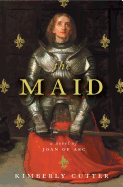
Before she became Joan of Arc, she was simply Jehanne--a poor, neglected, often abused girl from a nowhere village in a forgotten region of France--until the voices came, and with them the certainty that she was God's chosen vessel to triumph over the English and turn the tide of war.
Debut novelist Cutter spends little time debating whether the voices were true or a hallucination; instead, she shows Jehanne's single-minded determination to convince the brokers of power that they could defeat the English (which they eventually did, though not for another 30 years). Jehanne comes off as a bit of a fanatic--but then, wasn't she?--whose obsession allows her to sidestep some unpleasant questions, such as whether her voices' orders to kill go against God's message of peace and goodwill. Not necessarily pretty, she still manages to attract many of the men she fights with or argues against, and some of the book's most humanizing moments come when she grieves for the husband, children and stable family life she will never know.
Readers may wish for a map to keep track of the progression of battles, but the author--and Jehanne--sweep us along on the rising tide of victories against the English, punctuated by a few devastating defeats. For lovers of historical drama, this story has all the right ingredients: bloody fighting, brave death on the battlefield, unrequited love, unsavory court politics and a heroine whose story compels us, even though we know how it ends. --Katie Noah Gibson, blogger at Cakes, Tea and Dreams

